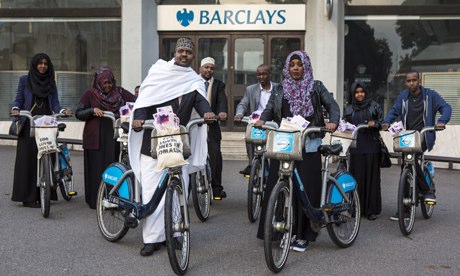
Somali campaigners and Oxfam call for Barclays to reverse the decision to closeaccounts allowing Somalis in the UK to send money home. Photograph: Andrew Aitchison/Oxfam

Thursday, October 17, 2013
advertisements
Bank agrees to keep money-transfer firm's account open until after verdict, as UK unveils moves to aid Somali remittances.A high court judge is expected to hand down a decision next week on an injunction sought by Dahabshiil, the biggest remittance company in the Horn of Africa, against Barclays's decision to close its account.
Barclays has agreed to continue to keep Dahabshiil's account open until after the verdict. The hearing, which took place at the high court before Mr Justice Henderson, ended on Wednesday.
"We are pleased to reassure customers (both individuals and NGOs) who rely on our services in the UK and across Africa that Dahabshiil remains open for business," the company said in a statement. "The court hearing has now concluded, and the judge's decision will follow later. Barclays has agreed to continue to keep our accounts open until judgment is received."
Barclays, the last major bank providing remittance services, announced in May that it planned to shut down the accounts to about 250 money-service businesses, initially giving a 10 July deadline, citing concern over falling foul of money-laundering regulations.
But after an outcry from Somali remitters, academics and some MPs, who said the bank's concerns were exaggerated, the deadline was pushed back. Dahabshiil, the only money-transfer organisation whose account is still open, sought an injunction to stop Barclays from shutting it down. It claimed that Barclays is abusing a dominant position by proposing to end an existing relationship without objective justification and by treating Dahabshiil differently from other customers.
Barclays had said it was closing the accounts of around 250 money-service businesses because it is obliged to follow rules and regulations set by governments.
"We understand and appreciate the important role these businesses play in helping people to transfer money around the world, in some cases to places where there is great need of financial support," a spokesman said. "However, Barclays has an obligation to operate within the rules and regulations set by governments and regulators in the countries in which we do business. Failure to do so would result in Barclays being prosecuted by regulators around the world and potentially fined many hundreds or potentially billions of pounds."
Somalis living in the UK send more than £100m a year for food, healthcare and education to relatives back home. Somalia is particularly depended on money-service businesses such as Dahabshiil as it lacks a formal banking system after decades of war.
"Barclays's closure of the accounts will mean my 80-year-old mother-in-law won't receive the money she relies on for food, rent and healthcare," said Farhan Hassan, whose change.org petition calling on the bank not to cut the lifeline was endorsed by double Olympic gold medallist Mo Farah, and has more than 100,000 signatures.
"My relatives in Somalia know about Barclays's decision in the UK and they don't understand why the banks and government can't work together on the issue. It is unwise and unethical that a gap is going to be left before a solution is put in place."
Somalia, which is struggling to get back on its feet after decades of war, stands to be the country most affected by Barclays's decision.
Annual remittances from the UK amount to more than £15bn worldwide, with up to 65% flowing to developing countries. The UK has one of the largest money-transfer markets in Europe as well as the largest number of money-transfer operators.
After a meeting last month, chaired by senior officials from the Treasury and the Department for International Development (DfID), the government announced several steps to deal with the fallout from Barclays's move. The measures included a planned "safe corridor" for transferring money between the UK and Somalia.
The pilot scheme will be developed to establish and test audit mechanisms to track payments at the sending, clearing and receiving stages of the remittance process. DfID will work with the World Bank to support the development of an audit mechanism and train money-transfer operators in Somalia over the next 12 months.
The government will also form an action group to draft guidance on anti-money laundering, while the National Crime Agency will provide more detailed and specific risk assessments and alerts about the sector to banks and money-transfer companies, to help differentiate the risks involved in dealing with different money transmitters.
Development experts welcomed the government action, but expressed concern about what would happen in the short term. "The Treasury plans are interesting," said Laura Hammond, head of development studies at the School of Oriental and African Studies, "but it will take months for them to be put in place and there is no plan for what to do to safeguard the corridor in the short run, until the proposed steps are put in place and banks agree to work with the money-service businesses."